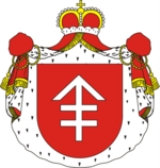
Jan Kazimierz Sapieha the Elder
Encyclopedia

He was the son of Franciszek Stefan Sapieha, father of Piotr Paweł Sapieha and Paweł Sapieha. A supporter of Stanisław Leszczyński, he took part in many battles of the Great Northern War
Great Northern War
The Great Northern War was a conflict in which a coalition led by the Tsardom of Russia successfully contested the supremacy of the Swedish Empire in northern Central Europe and Eastern Europe. The initial leaders of the anti-Swedish alliance were Peter I the Great of Russia, Frederick IV of...
. Charles XII of Sweden
Charles XII of Sweden
Charles XII also Carl of Sweden, , Latinized to Carolus Rex, Turkish: Demirbaş Şarl, also known as Charles the Habitué was the King of the Swedish Empire from 1697 to 1718...
considered him a good commander, and influenced his relative, Jan Kazimierz Sapieha the Younger
Jan Kazimierz Sapieha the Younger
Jan Kazimierz Sapieha the Younger was a Grand Hetman of Lithuania since 1682. He held the title of a Duke since 1700. In 1681 he became Field Hetman of Lithuania, the following year he also became the voivode of Vilnius....
, to pass the Grand Hetman post to him. He defeated Grzegorz Antoni Ogiński
Grzegorz Antoni Ogiński
Grzegorz Antoni Ogiński was a Polish-Lithuanian Hetman and governor-general of the Duchy of Samogitia from 1698. Ogiński was one of the leaders of the uprising against the Sapieha Lithuanian magnates. He was successful in the Lithuanian Civil War which culminated in the Battle of Olkieniki on...
at the battle of Lachowce
Lachowce
Łachowce is a village in the administrative district of Gmina Telatyn, within Tomaszów Lubelski County, Lublin Voivodeship, in eastern Poland. It lies approximately south of Telatyn, east of Tomaszów Lubelski, and south-east of the regional capital Lublin....
, but in 1709 after the Russian victory of Swedes at Battle of Poltava
Battle of Poltava
The Battle of Poltava on 27 June 1709 was the decisive victory of Peter I of Russia over the Swedish forces under Field Marshal Carl Gustav Rehnskiöld in one of the battles of the Great Northern War. It is widely believed to have been the beginning of Sweden's decline as a Great Power; the...
he surrendered to Augustus II the Strong
Augustus II the Strong
Frederick Augustus I or Augustus II the Strong was Elector of Saxony and King of Poland and Grand Duke of Lithuania ....
and was forced to abandon his hetmanship. In 1716 he joined the anti-Saxon
Saxony
The Free State of Saxony is a landlocked state of Germany, contingent with Brandenburg, Saxony Anhalt, Thuringia, Bavaria, the Czech Republic and Poland. It is the tenth-largest German state in area, with of Germany's sixteen states....
Tarnogród Confederation
Tarnogród Confederation
The Tarnogród Confederation was a confederation of szlachta in Polish-Lithuanian Commonwealth, in the years 1715–1716. It was formed on 26 November 1715 in Tarnogród by nobility angered by illegal taxation, levied for Saxon forces operating in Grand Duchy of Lithuania on behalf of Augustus II the...
. In the last years of his life he became a supporter of the Russian Empire
Russian Empire
The Russian Empire was a state that existed from 1721 until the Russian Revolution of 1917. It was the successor to the Tsardom of Russia and the predecessor of the Soviet Union...
, in particular, of Catherine I of Russia
Catherine I of Russia
Catherine I , the second wife of Peter the Great, reigned as Empress of Russia from 1725 until her death.-Life as a peasant woman:The life of Catherine I was said by Voltaire to be nearly as extraordinary as that of Peter the Great himself. There are no documents that confirm her origins. Born on...
, for which in 1726 he was rewarded with a rank of field marshal
Field Marshal
Field Marshal is a military rank. Traditionally, it is the highest military rank in an army.-Etymology:The origin of the rank of field marshal dates to the early Middle Ages, originally meaning the keeper of the king's horses , from the time of the early Frankish kings.-Usage and hierarchical...
, and in 1727, Governor-General
Governor-General
A Governor-General, is a vice-regal person of a monarch in an independent realm or a major colonial circonscription. Depending on the political arrangement of the territory, a Governor General can be a governor of high rank, or a principal governor ranking above "ordinary" governors.- Current uses...
of Saint Petersburg
Saint Petersburg
Saint Petersburg is a city and a federal subject of Russia located on the Neva River at the head of the Gulf of Finland on the Baltic Sea...
(Saint Petersburg Governorate
Saint Petersburg Governorate
Saint Petersburg Governorate , or Government of Saint Petersburg, was an administrative division of the Russian Empire, which existed in 1708–1927....
) and Ingria
Ingria
Ingria is a historical region in the eastern Baltic, now part of Russia, comprising the southern bank of the river Neva, between the Gulf of Finland, the Narva River, Lake Peipus in the west, and Lake Ladoga and the western bank of the Volkhov river in the east...
.

